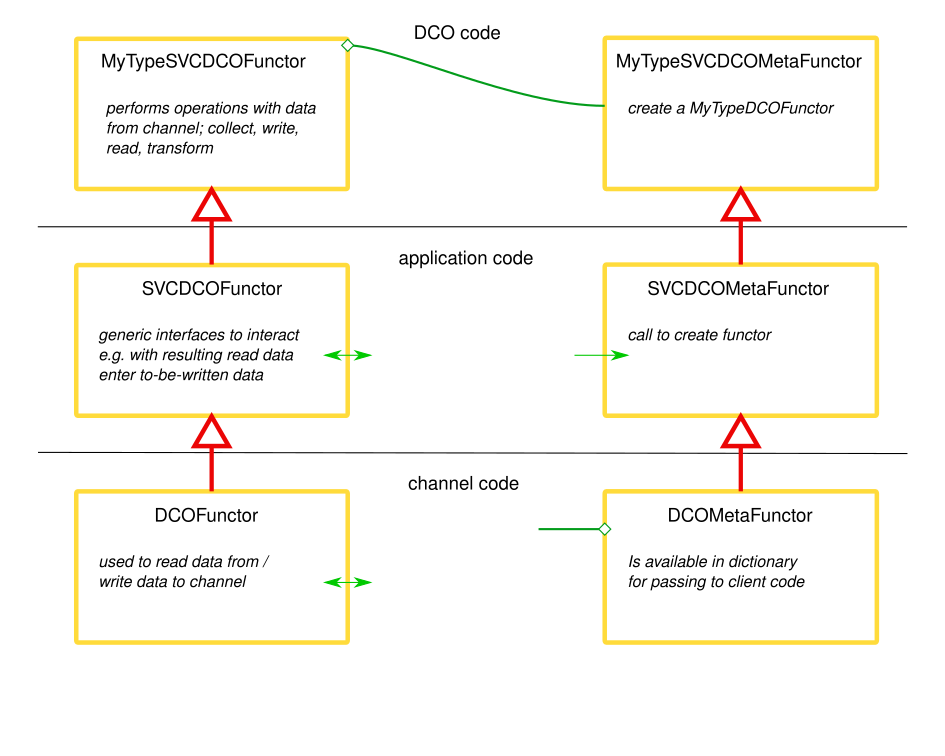For creating generic interaction with channels, a functor mechanism is available.
This functor mechanism is used by the hdf5 logging, but can be used for other purposes as well.
The hdf5 logging capabilities for DUECA used a mechanism for directly processing data in the channel access code. Rather than "reading" data from a channel, for which client code needs to know, or investigate, the structure of the data, an operation can be directly requested from a dueca::ChannelReadToken . For the hdf5 logging, that operation is the writing of the DCO object data into a logging file.
After an initial implementation specific for hdf5 logging, which lived for a mere few days, I recognised the need for a generic mechanism, and created a set of functors that implement a specific type of service for a certain datatype. This page explains about the service functors.
Overview of functors
To clarify a bit, take the example of the HDF5 functors. The following set of classes is defined:
A dueca::DCOFunctor . The DCOFunctor is the base class for all types of functor. This class has only virtual functions, these will be used by the ChannelReadToken and ChannelWriteToken classes to read from respectively write data into the channel. To get something useful out of this, the DCOFunctor needs two children:
One child common for the type of service; in the example this is the dueca::hdf5log::HDF5DCOReadFunctor. This child implements the client-side interface in its constructor. For the hdf5 code it accepts the file to log into, the path where data is to be logged, a "chunk" size, the number of elements in a DCO object, and whether the time information needs to be recorded. You generally need access to this child class in your (generic) modules.
A second child of the generic HDF5DCOFunctor that is specific to the DCO type logged. These are created by the code generator, but you can also code these by hand for specific custom-designed services. This child calls the parent (HDF5DCOFunctor), and it needs to know the data for the parent's constructor. These data are dependent on the users wishes (which file, etc. ). Typically you don't have access to this child class from module code, and for HDF5 it is even hidden in the .cxx file of a DCO object.
To get access to the service functors themselves, a meta-functor is used. DUECA's base metafunctor is dueca::DCOMetaFunctor. This class has no methods at all.
For each service, a child class of the DCOMetaFunctor is created. For the HDF5 service it is dueca::hdf5log::HDFDCOMetaFunctor . This functor has a getFunctor call (a virtual method), which gets supplied with all the client-side information needed for the functor.
Again, a (simple) derived class of the HDFDCOMetaFunctor is created for each DCO object equipped with hdf5 capabilities. At start-up time, a single instance of this derived class is created. It can be found by the ChannelReadToken if the service name is supplied, with the dueca::ChannelReadToken::getMetaFunctor templated method.
There it is cast back to the service-specific class (in the exaple HDFDCOMetaFunctor), and supplied to the client. Using the metafunctor you can generate a functor (whose internals will remain unknown to both the client and the channel), that can be used to perform the service.
With the pair of functors, code that knows only about the service (through the functors' middle classes) can invoke this service for channel entries with DCO objects for which the service has been implemented.
The functor classes use inheritance to live in three different areas of code. The channel code knows the functor by the DCOFunctor and DCOMetaFunctor parents, that only allow
- to find and return a specific metafunctor matching the channel data type and the requested service
- to call a functor with the channel data
The client code knows the first child of this, which exposes the interfaces to the service. With this, the meta functor can be used to create a functor, and the functor data can be saved or viewed.
The DCO object code knows the most specific versions of functor and metafunctor objects, both specific for the DCO class and the service. The following figure gives an overview:

Code generation
To make functor generation for DCO objects accessible for developers, the code generator has been extended with a plugin mechanism. Plugins can be installed with the DUECA installation (generally /usr/share/dueca/DCOplugins ), the name of the plugin file (without the .py extension) defines the name of the service. The plugin files contain a single class definition, AddOn, which has a number of methods to print additional code for
- header includes
- class body
- additional definitions in the header
- body file includes
- additional code for the body
Inspect the hdf5.py file to see how to create such an extension
What to do with this?
This has many possibilities for creating generic modules. What about serializing data to JSON or xml? Reading back and playing back data? Reading and assembling data in vectors for plotting on-line graphs?